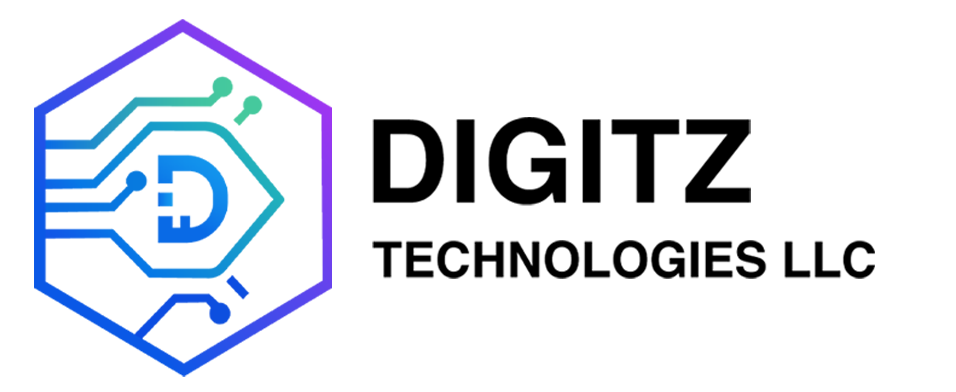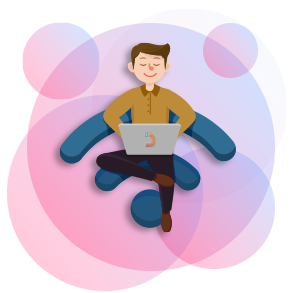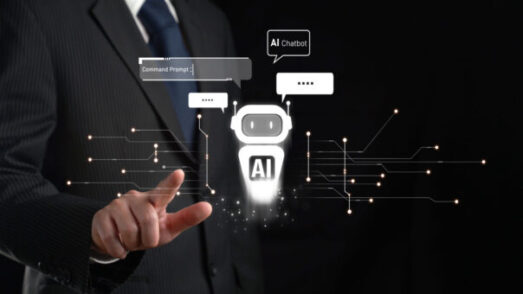We’re living in an era where speed and efficiency aren’t just nice to have—they’re everything. And honestly? AI is what’s making that possible. It’s not some sci-fi concept anymore. It’s real, it’s here, and it’s actually deciding which businesses move forward and which ones get left behind.
Here’s the thing: using AI today isn’t about getting ahead. It’s about staying in the game. If you’re not exploring what AI can do for your business, you’re already falling behind.
Every industry you can think of is being reshaped by AI. Marketing teams are working smarter. Sales teams are closing deals faster. Finance departments are making fewer errors. Operations are running smoothly. It’s happening everywhere, and it’s happening fast.
Think about your business journey—from that initial spark of an idea to building your website, finding your audience, creating content, running campaigns, and managing sales. AI has become part of all of it. Not in a creepy, robot-takeover way. Just in a practical, “wow, this actually makes my life easier” way.
As we’re moving through 2025, something’s becoming clear: the companies using the best AI tools strategically are seeing real results. Better productivity. Smarter decisions. More efficient teams. It’s not magic—it’s just smart use of the right tools.
So let’s dive into the best AI tools 2025 has to offer that are actually worth your time.
1. CRM and Sales: Turning Data into Relationships
Let’s talk about sales and CRM for a second. These are the heartbeat of any business that wants to grow. But here’s what’s changed: AI-powered CRMs aren’t just fancy contact lists anymore. They’re predicting what your customers will do next, automating follow-ups, and literally telling you the smartest move to make.
Salesforce Einstein is the heavyweight champion here. If you’re running a large enterprise with complicated sales processes, this is your friend. It scores leads so you know who to focus on, manages tasks automatically, and gives you insights that feel almost psychic. It’s built for teams juggling complex pipelines.
HubSpot AI is more of an all-rounder, perfect for small and mid-sized businesses. The beautiful thing about HubSpot is how it brings marketing, sales, and service together. Its AI cleans up messy data (we all have it), forecasts your sales, and even listens to your team’s conversations to help them improve. It’s like having a really smart assistant who never sleeps.
Zoho CRM brings Zia to the table—that’s their AI assistant. Zia watches your sales patterns, tracks where deals are going, and suggests ways to make your workflows better. If you’re a growing team or a startup trying to scale up, Zoho hits that sweet spot between powerful and affordable.
Pipedrive AI is all about keeping things clear. It automates your sales tracking, manages your pipeline, and helps with forecasting. Sales professionals love it because it cuts through the noise and shows them exactly what they need to close deals faster.
Outreach.io is a game-changer for sales development teams. It helps you optimize your outreach sequences and understand how people are actually feeling about your messages. That sentiment analysis? It’s gold for making your customer interactions smarter and more human.
The bottom line with all these best AI tools? They free up your team from the grunt work so they can focus on what actually matters—building real, meaningful relationships with customers. And those relationships? They’re backed by data that actually means something.
2. Marketing and Content Creation: Creativity Meets Automation
Marketing is tough. You need to be creative, consistent, and data-driven all at once. That’s a lot to juggle. Good news? AI tools are making it possible to nail all three without losing your mind.
Jasper AI and Copy.ai have become absolute essentials for anyone creating content. Whether you’re a marketer, an entrepreneur, or running a content team, these tools are lifesavers. They pump out brand-consistent, SEO-friendly content in minutes. Blog posts, social media captions, ad copy—you name it. And it doesn’t sound like a robot wrote it.
Writesonic is the go-to for agencies and e-commerce brands that need to scale fast. It handles the heavy lifting on long-form articles, landing pages, and product descriptions. And here’s the kicker—it maintains that human-like tone that actually connects with readers.
ChatGPT and Claude AI are fantastic for the creative side of things. Need to brainstorm? They’re there. Writing video scripts? They’ve got you. Planning campaigns? They help you find that natural flow that makes content feel authentic, not forced.
Now, if you’re into analytics (and you should be), Tableau AI from Salesforce is brilliant. It takes all your campaign data and turns it into visuals you can actually understand. You’ll spot trends faster, track your ROI properly, and make decisions based on what’s actually working—not just gut feeling.
Even the big digital marketing agencies are leaning hard on tools like Jasper, ChatGPT, and Writesonic these days. It’s how they manage multiple campaigns and still deliver quality work at scale. In fact, digital marketing agencies worldwide are reporting significant time savings and improved client results by integrating these best AI tools into their workflows.
Here’s what people get wrong about AI in marketing: it’s not replacing creativity. It’s amplifying it. AI handles the repetitive stuff—the heavy lifting—so you can focus on strategy, big ideas, and creative direction. That’s where the real magic happens. Small digital marketing agencies and large firms alike are discovering that these tools level the playing field, allowing them to compete with anyone.
3. Human Resources: Smarter Hiring, Happier Teams
Hiring people is hard. Managing them well is even harder. But AI is making both significantly easier, and in ways that actually make sense.
Eightfold AI uses some seriously deep learning to match candidates with the right roles. But here’s what makes it special—it actively works to minimize unconscious bias in your hiring process. That means you’re getting better candidates and building more diverse teams.
Paradox, or as everyone calls it, Olivia, is an AI chatbot that handles the stuff nobody likes doing. Initial screenings? Olivia’s got it. Scheduling interviews? Done. Answering basic HR questions? Yep. It’s especially popular in retail and hospitality where you’re hiring a lot and need things to move fast.
HireVue brings AI into video interviews and skill assessments. It’s helping companies evaluate candidates more objectively and consistently, which is huge when you’re trying to scale your hiring.
Textio does something really cool—it improves your job descriptions. It uses data to suggest language that’s more inclusive and effective. Better job posts mean better candidates applying. Simple as that.
For the day-to-day HR operations and onboarding, tools like Leena AI, Talla, and BambooHR are streamlining everything. Less paperwork, more time actually connecting with your people.
And when it comes to performance management, Lattice, Betterworks, and Effy AI help you track progress, boost productivity, and build a stronger company culture. They make those check-ins and reviews actually useful instead of just another box to tick.
What all these platforms do is give HR teams their time back. Less time buried in admin work, more time doing what actually matters—engaging with employees, building culture, making people feel valued. That’s how you create workplaces people actually want to be part of.
4. Operations and Workflow Automation: Work Smarter, Not Harder
Let’s be real—day-to-day operations can be a huge time drain. All those little tasks that have to get done but don’t really move the needle? They add up. Unless you automate them. That’s where business automation software powered by AI comes in clutch.
Zapier AI is like the Swiss Army knife of automation. It connects over 8,000 apps and automates workflows between them. If you’re a small business or startup drowning in repetitive admin tasks, Zapier is probably going to save your sanity. It’s that good.
Notion AI is changing how teams work together. It’s more than just a note-taking app now. It summarizes your notes, generates project briefs, automates team updates—basically acts like a really smart digital workspace that keeps everyone on the same page.
UiPath is for when you need serious, enterprise-level automation. We’re talking Robotic Process Automation (RPA) that handles complex workflows with precision. Invoice processing, HR onboarding, reporting—UiPath manages all of it without breaking a sweat. It’s built for scale.
Airtable AI and ClickUp AI are also worth mentioning. They’re enabling seamless collaboration and automation for creative teams, marketing departments, and software development groups. Everyone from designers to developers is using these to stay organized and productive.
These AI productivity tools aren’t just nice to have—they’re genuinely redefining how companies function. You get more done in less time, without sacrificing accuracy. And that’s the whole point, right?
5. Finance and Accounting: Accuracy Through Automation
When it comes to finance, there’s zero room for error. None. And that’s exactly why AI tools are becoming non-negotiable in accounting departments. They’re eliminating the human errors that used to be just part of the job.
QuickBooks, with its Intuit Assist feature, is perfect for freelancers and small businesses. It automates expense tracking, handles invoicing, and even forecasts your cash flow. For anyone running a small operation, it’s like having a personal accountant without the hefty price tag.
Stampli steps in for larger enterprises. It uses AI to manage invoices, detect weird anomalies you might miss, and streamline the whole approval process. When you’re dealing with high volumes of transactions, catching those anomalies early is huge.
Botkeeper and Dext Prepare are simplifying bookkeeping in ways that seemed impossible a few years ago. Automated data capture, reconciliation—all the tedious stuff that used to eat up hours. Now it happens automatically, and accurately.
Workiva and Zebra AI help finance teams with real-time reporting and staying on top of compliance. In a world where regulations keep changing, having AI that keeps you compliant is pretty invaluable.
These enterprise AI solutions do three things really well: they improve accuracy, they save massive amounts of time, and they help you make financial decisions based on solid data. That confidence in your numbers? That’s what helps businesses grow strategically instead of just hoping for the best.
6. AI Tools for Developers: Building Smarter, Faster
If you’re in software development, you already know—AI is changing everything. How code gets written, tested, and deployed. The whole process is different now. Whether you’re part of a software development company or an independent developer, these tools are becoming essential.
GitHub Copilot is like having another developer sitting next to you. It suggests entire lines or even full functions as you’re coding, in real time. The productivity boost is real. Developers who use it regularly say it’s changed how they work.
Tabnine and Replit Ghostwriter are helping developers power through repetitive coding tasks without sacrificing quality. They’re smart enough to understand context and suggest code that actually makes sense for what you’re building.
Kite uses deep learning to recommend accurate code snippets and generally just makes your workflow more efficient. Less time googling syntax, more time actually building.
Snyk AI focuses on security, which is increasingly critical. It detects vulnerabilities early in the development cycle, way before they become expensive problems in production. For any company serious about security, it’s essential.
These AI tools for developers aren’t just about coding faster. They’re about maintaining cleaner codebases, catching issues early, and freeing up mental energy for the hard problems that actually need human creativity and problem-solving. That’s where innovation happens—when you’re not bogged down in repetitive tasks.
Final Thoughts: Integrate with Intention
AI is transforming business, no question. But it’s not just about jumping on every shiny new tool you see. It’s about being intentional. Strategic. Smart about it.
Start by looking at where you’re actually bleeding time. What’s slowing you down? Are manual approvals creating bottlenecks? Are repetitive tasks pulling your focus away from the strategic work that really matters? That’s where AI makes the biggest impact. That’s where you should start.
When you’re choosing tools, think about integration. Seriously. Make sure whatever you adopt works seamlessly with your existing CRM, HR systems, financial software—whatever you’re already using. Data compatibility isn’t sexy, but it matters. So does scalability. And compliance. Don’t overlook the boring stuff that keeps your business running smoothly.
Most importantly—and I can’t stress this enough—AI should enhance human intelligence, not replace it. Keep creativity at the center. Keep empathy in your customer interactions. Keep human judgment in your decision-making. AI is a tool, not a replacement for thinking.
The businesses that get this balance right in 2025? They’re going to lead their industries. They’re combining human potential with AI innovation in ways that make them smarter, faster, and yes, more profitable. But more than that—they’re building organizations that work better for everyone involved.
That’s the real opportunity here. Not just using AI because everyone else is, but using it in ways that genuinely make work better, decisions smarter, and businesses more human. That’s the future worth building.


